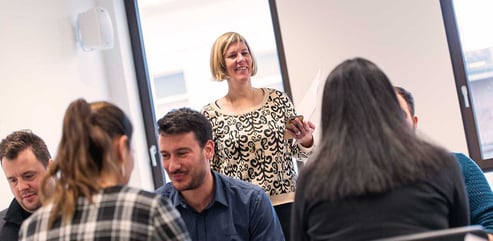"Never waste a good crisis." Churchill's famous statement has already been used to call on the hospitality industry to reinvent itself, to boost green innovations, to urge the European institutions to review their cooperation model. And here I am, boldly adding yet another one: never waste a good crisis to take up leadership development.
Although, as J. Pfeffer argues in “Leadership BS”, we will first have to separate the wheat from the chaff. The leadership development industry is swamping us with models that prescribe effective leadership, but it often overlooks the development part. In today's discourse, too, the emphasis is more on the type of leadership we need to be coronavirus-proof, rather than on the search for effective ways to let leaders grow in this regard. What are these effective ways? And, as a layman, how do you take your pick from the numerous leadership development practices?
What does science have to say?
Unlike learning, where you acquire new knowledge or leadership skills, development stands for increasing your mental complexity. Being able to find blind spots in your worldview is a sign of growth.
"If, as an organization, you want to ensure that your leaders really develop, then it is key to have a good understanding of how adults develop."
Neuroplasticity
Research has shown that even so-called “adults” still make major leaps in mental complexity and that our brain has the capacity to keep developing (neuroplasticity).
Adult development theory distinguishes three phases after our twenties.
- The “socialized mind” where we are determined by standards and expectations from our immediate environment.
- The “self-authoring mind” that enables us to evaluate the outside world’s expectations from our own internal compass and to make choices.
- And the “self-transforming mind” with which we can transcend our own thinking and regard it as just one possible ideology.
Research also shows that the majority (up to 58 percent) does not get past the phase of the “socialized mind”. First and foremost, we remain loyal soldiers to our team or organization.
To the level of self-transformation
Even more striking is that only a very small group (7 percent) reaches the final stage of “self-transformation”. And what do we need today? The coronavirus crisis has forced us to face the facts–at all levels of the organization we need employees who can work independently, either from home or elsewhere, and take initiative (= self-authoring). And we need leaders who reinvent business or see connections to systems outside their immediate field of view (=self-transforming). How can you take the mental complexity of your employees and leaders to a higher level?
Leadership development in times of coronavirus
"This crisis holds an opportunity for development. The issues we are now facing, make us more aware than ever of our limits of thought."
“Local versus global?” “Is working from home here to stay?” As underlying assumptions are busted, we realize that our current models are only one possible lens that has its limitations, and we go looking for new, often more comprehensive models, to grasp the complexity.
Resolutely focusing on development as an organization means acknowledging that:
- We continue to grow and develop even after our twenties.
- Development takes time and is, ideally, integrated in daily operations.
- Development starts from personal challenges in which one wants to grow.
- Both mind and heart need to be taken into account if we want people to broaden their view. Questioning existing assumptions often triggers intense emotions.
- Continuous, thorough, structured, and active reflection is needed to achieve growth. It will not do to sporadically make time for reflection.
- You have to provide your organization with the safety it needs to deal with the risks involved in changing one’s worldview.
This article appeared (in Dutch) in HRmagazine on June 23, 2020.
Get in touch
Do you want to contact the author? Or do you have a question? Let her know via Karen.Wouters@ams.ac.be .




